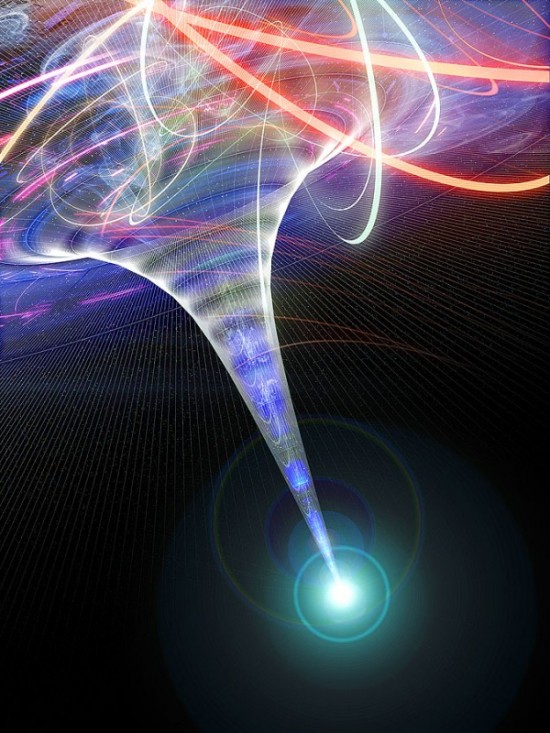
Are you seeing the stories this week suggesting that the Big Bang didn’t happen? According to astrophysicist Brian Koberlein – a great science communicator at Rochester Institute of Technology with a popular page on G+ – that’s not quite what the new research (published in early February 2015 Physics Letters B, has suggested. The new study isn’t suggesting there was no Big Bang, Koberlein says. It’s suggesting that the Big Bang did not start with a singularity – a point in space-time when matter is infinitely dense, as at the center of a black hole. How can this be? Koberlein explains on his website:
The catch is that by eliminating the singularity, the model predicts that the universe had no beginning. It existed forever as a kind of quantum potential before ‘collapsing’ into the hot dense state we call the Big Bang. Unfortunately many articles confuse ‘no singularity’ with ‘no big bang.’
The new model – in which our universe has no beginning and no end – comes from Ahmed Farag Ali at Benha University in Egypt and coauthor Saurya Das at the University of Lethbridge in Alberta, Canada. Their paper looks at a result derived from Einstein’s theory of general relativity known as the Raychaudhuri equation. Koberlein says:
Basically his equation describes how a volume of matter changes over time, so its a great way of finding where physical singularities exist in your model. But rather than using the classical Raychaudhuri equation, the authors use a variation with a few quantum tweaks. This approach is often called semi-classical …
The upshot is that this work eliminates the need for an initial singularity of the Big Bang. That is, it eliminates the need for a single infinitely dense point from which our universe sprang some 13.8 billion years ago. The Big Bang itself, however, can still have happened, according to this model. Koberlein says:
The Big Bang is often presented as some kind of explosion from an initial point, but actually the Big Bang model simply posits that the universe was extremely hot and dense when the universe was young. The model makes certain predictions, such as the existence of a thermal cosmic background, that the universe is expanding, the abundance of elements, etc. All of these have matched observation with great precision. The Big Bang is a robust scientific theory that isn’t going away, and this new paper does nothing to question its legitimacy.
Enjoying EarthSky so far? Sign up for our free daily newsletter today!
One appealing feature of the new paper is that it also predicts a cosmological constant, a concept originally introduced by Albert Einstein in 1917. Einstein added a cosmological constant to his theory of general relativity keep the universe static, rather than expanding, but he later abandoned the concept as his “greatest blunder” after Edwin Hubble’s 1929 discovery that all galaxies outside our Local Group are moving away from each other. The idea of a cosmological constant was discarded for some decades, but, since the 1990s, developments in cosmology have revived the idea that we need one to explain the universe as we observe it. In Ali and Das’ new model, a cosmological constant provides a proposed mechanism for the mysterious dark energy known to pervade space and cause an observed acceleration in the expansion of the universe.
So Big Bang theory is alive and well. And, Koberlein says:
While this is an interesting model, it should be noted that it’s very basic. More of a proof of concept than anything else. It should also be noted that replacing the Big Bang singularity with an eternal history isn’t a new idea. Many inflation models, for example, make similar predictions.
Still, it’ll be interesting to see if this model ignites interest among cosmologists and ultimately contributes to altering our thinking about a Big Bang singularity, which has been a fact of most of our lives since we were born. Big ideas like this do change, and it’ll be fun to see if this one does!

Bottom line: Most of us understand the Big Bang as the idea that our entire universe came from a single point, what astrophysicists call a “singularity.” But we might not need a singularity to have a Big Bang, according to a new study by Ahmed Farag Ali in Egypt and coauthor Saurya Das in Canada. The catch – according to astrophysicist Brian Koberlein – is that, without the singularity, this model predicts that the universe had no beginning. It existed forever as a kind of quantum potential before collapsing into the hot dense state we call the Big Bang.
Via Phys.org and astrophysicist Brian Koberlein.











